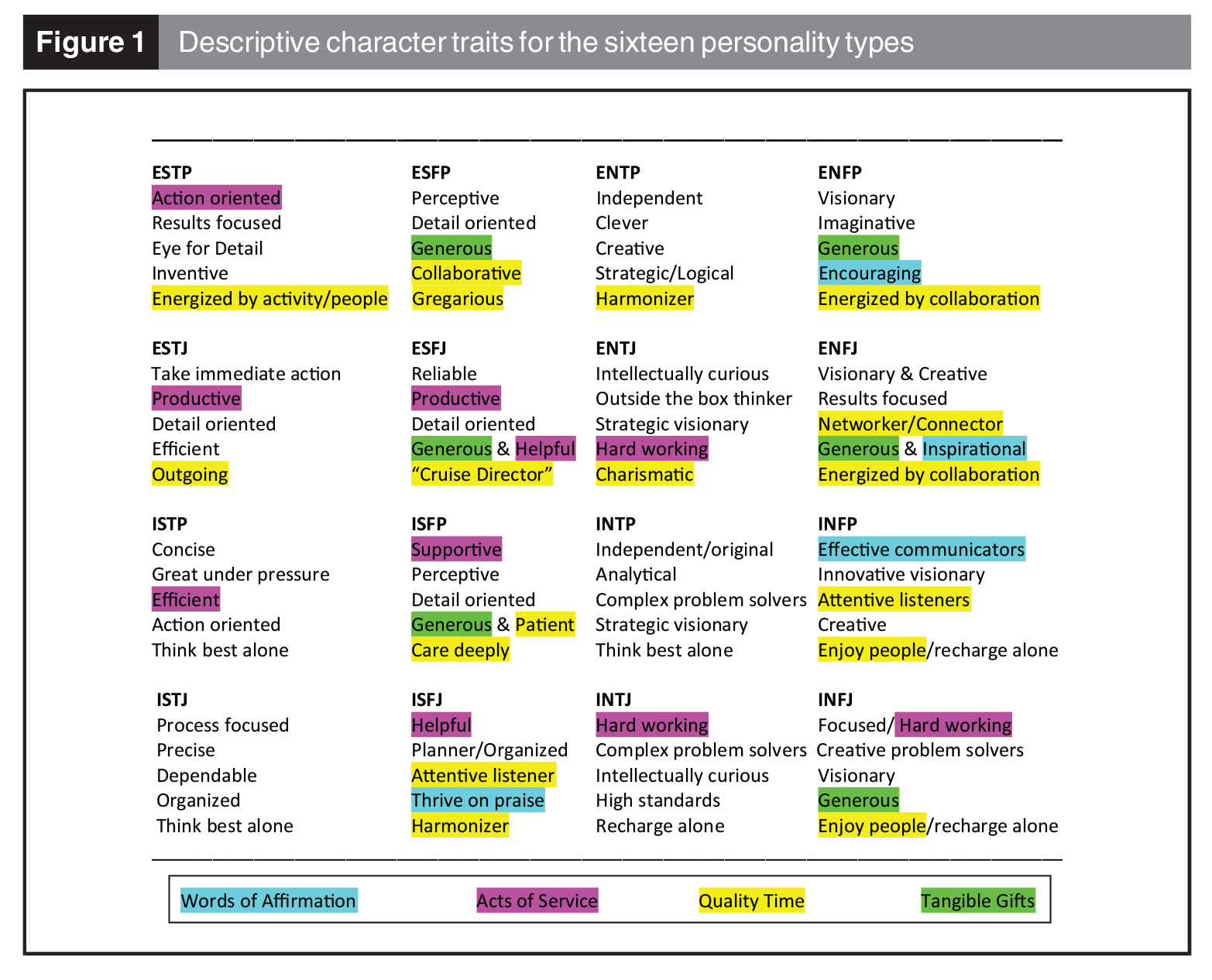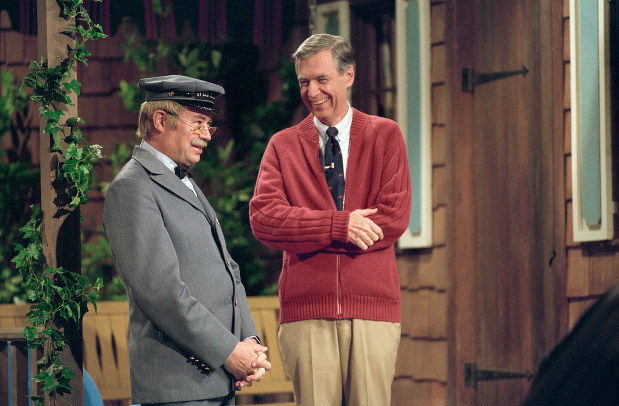How Personality Type And Languages Of Appreciation Interrelate
This article was originally published here by Appreciation at Work
— by Dr. Paul White
People often comment, “I wonder how the Myers-Briggs and the 5 Languages of Appreciation might be related?” We wondered about this, too, and so we conducted a research study to discover the answer.
Categorizing people into distinct personality types has been an area of interest for millennia and numerous approaches to finding various dimensions of personality characteristics have been utilized. The Myers-Briggs Type Indicator® is a well-known approach to assessing personality which divides personality characteristics into four continua:
Extroversion / Introversion
Extroversion (E) – people-oriented, talkative, outgoing
Introversion (I) – inward focus, reflective, pensive, task-oriented
Sensing / Intuition
Sensing (S) – reality-based, practical, literal
INtuition (N) – imaginative, big picture, ideas & concepts
Thinking / Feeling
Thinking (T) – logic, value justice
Feeling (F) – personal values & how things impact others/empathetic
Judging / Perceiving
Judging (J) – structured, predictable
Perceiving (P) – keep options open, spontaneous
These are then combined to create 16 personality types (e.g., ENFP) used to help identify styles of interacting with others.
We conducted a research study with 300 employees to explore the relationship between Myers-Briggs personality types and the 5 languages of appreciation. The TypeCoach Verifier is an interactive approach which was used to help participants determine preferences on the 4 Myers-Briggs dimensions. The Motivating By Appreciation (MBA) Inventory identifies the languages of appreciation that employees prefer to be shown appreciation by their colleagues.
The interrelatedness of the Myers-Briggs personality types and individuals’ preferred language of appreciation was investigated, and, as predicted, the two were found to be independent constructs. This is consistent with prior related research finding no relationship between employees’ languages of appreciation and their personality type as assessed by the DISC. Thus, it appears that personality style and preferred ways of receiving appreciation appear to be independent.
How the Myers-Briggs and 5 Languages of Appreciation Can Be Used Together
Despite the fact that these two constructs are independent, each assessment provides additional valuable information which the other tool does not. Individuals’ personality type (style of relating to others and completing tasks) is helpful to know in building teams to facilitate working together effectively. Similarly, communicating appreciation to colleagues in the ways most meaningful to them helps create a more supportive and encouraging workplace, which facilitates employee engagement.
More importantly, the information given by each assessment can also enhance the applicability of the results from both tools. For example, while the MBA Inventory identifies what kind of act of appreciation an employee values (spending time together, a word of encouragement, etc.), one’s personality type provides information about how an employee prefers feedback – an introvert may prefer a private conversation, while an extrovert may prefer public praise.
Additionally, an individual’s personality type provides clues for what they want to be shown appreciation. See Figure 1 below for practical examples of characteristics highly valued by each personality type. Including mention of these within the context of a colleague’s preferred language of appreciation would make it even more personally relevant. For example, an INTJ whose primary language of appreciation is Quality Time might feel especially appreciated when the supervisor says, “Josh, let’s go out to lunch to celebrate your hard work and clever idea that resolved that issue and saved the company thousands of dollars.”

Further, there are certain characteristics within each Myers-Briggs personality that may present a challenge to either giving or receiving appreciation (See Table1). For example, people who are talkative need to make extra efforts to listen attentively to people whose primary language is Quality Time, or else the lack of focused attention will leave the individual feeling unappreciated.

Summary
Our research found that one’s personality style and preferred ways of being shown appreciation are independent – you cannot predict one from the other. However, combining the knowledge of how employees prefer to be shown appreciation along with the characteristics associated with their personality type will provide the most effective way of encouraging and supporting those with whom you work, and will be the most successful in creating a positive and effective workplace. As is often the case in life, “two is better than one!”
Related articles
Given our current circumstances, businesses and organizations have no option but to change. In-person meetings have become virtual video calls, conferences have been moved online or cancelled, and employees are working remotely.
We conducted a research study with 300 employees to explore the relationship between Myers-Briggs personality types and the 5 languages of appreciation. The TypeCoach Verifier is an interactive approach which was used to help participants determine preferences on the 4 Myers-Briggs dimensions. The Motivating By Appreciation (MBA) Inventory identifies the languages of appreciation that employees prefer to be shown appreciation by their colleagues.
One of the challenges we have as a society is that, as individuals, we have difficulty expressing the difference between our Opinions, Beliefs, and Convictions.
In the midst of uncertain times, Luke Roush and Jake Thomsen of Sovereign’s Capital provides a framework for how Christian business leaders can think about the unusual power and leverage the present circumstances have afforded them…
During this uncertainty brought on by COVID-19, we need to make sure our messaging is coming at the right time for our customers. If either too early or too late, it could confuse or antagonize them. Using the 3 steps in surfing above as a guide, here are suggestions on how you can communicate effectively.
The greatest challenge to virtual meetings is the lack of engagement. When participants are on a screen or on a phone, it’s very hard to resist the temptation to multi-task. It’s so easy to hit the mute button, pull up other screens and only engage when your name or job is mentioned. Here are some things you can do to help increase engagement and productivity in virtual meetings.
In this video you will hear from best-selling author, Patrick Lencioni, as he presents a powerful framework and simple advice for hiring and developing ideal team players in any kind of organization.
When we (C12 Group) first began to release information, resources and guidance on playing offense in regards to COVID-19 in February there were some reports of “what’s the big deal, it’s not effecting my city, business, industry.” Those delusions are quickly fading. As a global economy, human race, and universal Church everyone is and will be effected in one way or another.
Watch how Todd Stewart, this 2nd generation CEO of a $160M logistics company, saw his faith transform his workplace culture to have employee engagement soar over 70% as they sought to honor Christ by how well they steward people.
Every email you send, you spend precious capital. Time is a valuable resource, and you can waste people’s time if your communications are not worthwhile or incomplete. Send a few unhelpful emails, and you could lose the person forever…
Richardson business owner John Rogers asked a federal judge to dismiss a lawsuit accusing his former employees of stealing company secrets, after he says he received "a clear message from God" urging him to be generous.
Watch and observe effective leaders and influencers. They often are excellent at communicating through stories. Think about life experiences that have impacted you, and start to tell stories to teach important lessons to those you are leading.
Andy Crouch discusses the power of informality in the church and how we can best recognize and use it.
The movie honoring Mister Rogers’ life, A Beautiful Day in the Neighborhood, premieres in one week on November 22! Read Jordan Raynor’s thoughts here as he highlights Mister Rogers as an influence for Christ :)
Brenda McGowan is a proud native from the South Side of Chicago. She began her career in criminal justice reform in 2006 while serving as advisory council chairperson for the St. Joseph County Prison Reentry Initiative. Listen here to her work as Vice President of programming at Crossroads Prison Ministries.
Brian Fikkert of Chalmers discusses the risks of false stories and their impact on our lives. “Humans create culture in their own image… We worship what we love, and because our loves reflect our minds, affections, and wills, they shape our entire lives.”
Originally posted on FORBES — For the business decision-maker (he could be for-profit or not-profit), he or sometimes she – they’re the decision maker, they stand alone in some sense, they’re the entrepreneurs. Not lonely in that they didn’t have friends; they had more friends, in many cases, than they wanted.
Mentoring in retirement sounds like a wonderful idea. “Invest in the next generation. Share your life experience. Feel a renewed sense of purpose.” But in reality, far too often mentoring feels awkward for both mentor and mentee. The best mentoring relationships often look more like intergenerational friendship.
Originally published by Venture Hacks (co-founders of AngelList) — Entrepreneurs are the best business writers in the world. If you can’t write, you can’t raise money. Or recruit. Or sell.
Choosing inconvenient neighbors makes us more redemptive entrepreneurs. Jon Kontz shares his thoughts, “I know I need to be a good neighbor, yet I feel pressed to choose between community and opportunity.”
To be sure, leadership learning or ideation sparks new companies and new corporate direction, and yet, at the end of the day, it’s people that have eternal value and meaning to God. People don’t just want money for their day at your workplace, they want meaning.
“…as I’ve studied poverty and listened to the voices of others, I’ve become convinced that the problems poor people face aren’t solely material in nature. The material poverty that shows up in our world is really the result of something much deeper: broken relationships.”
Adapted from Becoming Whole: Why the Opposite of Poverty Isn’t the American Dream by Brian Fikkert and Kelly Kapic —aiming to expose the misconceptions of both Western Civilization and the Western church about the nature of God, human beings, and the world, they redefine success and offer new ways of achieving that success.
Who wins when I ask for big things? I have thought it was me, of course. Recently, however, I have been seeing a different dynamic at work when looking at three passages that follow each other in the book of John.
Some of us have heard of the powerful groups of friends like The Clapham Sect or perhaps the Inklings. Inventive friendship can be an extension of entrepreneurial calling & at their best, these inventive friendships are part of the redemptive fabric of faith in Jesus.
As iron sharpens iron, so one man sharpens another. (Prov. 27:17) — Friendship, especially biblical friendship, often demands more from you than you originally intended to give. Being close friends with another person takes commitment, accountability, trust, and a willingness to be vulnerable
Greg Leith, CEO & Board Member of Convene shares that “the spiritual forecast for our world is rather cloudy. Yet, regardless of the leader of your country, you’re still a leader in your company. The spiritual forecast for the world depends on you, and it starts in your business.”
Jay Stringer, a licensed mental health counselor, ordained minister, and author of "Unwanted: How Sexual Brokenness Reveals Our Way to Healing", joins Greg Leith of Convene to discuss a topic that few dare to touch. How does the power of a leader infused with their sexual brokenness impact their lives and the lives of those that they lead?
Originally published by FORBES — The Millennials, who were born into the age of information, have been described as lazy, narcissistic, entitled and unable to stay in one job, but also as the most purpose-driven and potentially the most entrepreneurial of all previous generations. Why?
——






























While many companies in recent years have spent some time developing their core values, they often end up gathering dust on the wall, ignored and irrelevant. If so many leaders and consultants champion them as a vital part of your organization, why does this happen?